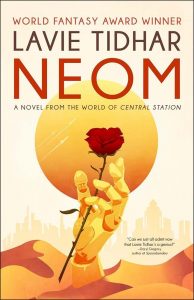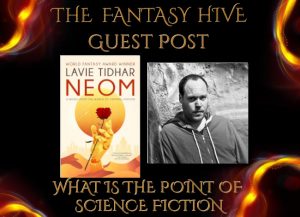What is the point of Science Fiction – GUEST POST by Lavie Tidhar (NEOM)
What is the Point of Science Fiction?
by Lavie Tidhar
I grew disaffected with the world of genre fiction a few years ago, and it turned out I was not alone. A couple of fellow novelists felt the same, and it cropped up a lot in our conversations. Very few people move between genre and the “straight” world. It took finding the right publisher to give me the confidence to set off on a huge, ambitious literary novel, and the result was Maror, published by Head of Zeus in August.
 What I realised as I was doing it, though, was that I still loved science fiction. I didn’t really want to quit. I just needed a change. It turns out that when you take out the weird stuff – the “elves and aliens”, as I sometimes call it – well, you start missing them after a while. At least I did. So during the second lockdown in the UK, while I was supposed to be finishing Maror, I went instead back to the world of Central Station, and wrote the misadventures of a rather odd robot as it arrives one day in the city of Neom, buys a flower and takes it out into the desert. This book, called Neom, is out now from Tachyon Publications.
What I realised as I was doing it, though, was that I still loved science fiction. I didn’t really want to quit. I just needed a change. It turns out that when you take out the weird stuff – the “elves and aliens”, as I sometimes call it – well, you start missing them after a while. At least I did. So during the second lockdown in the UK, while I was supposed to be finishing Maror, I went instead back to the world of Central Station, and wrote the misadventures of a rather odd robot as it arrives one day in the city of Neom, buys a flower and takes it out into the desert. This book, called Neom, is out now from Tachyon Publications.
It got me thinking. What is the point of science fiction?
It’s probably not a question that should keep anyone awake at night, but still. More precisely, I guess, the question is: what is the aesthetic or moral value of science fiction?
For me, science fiction was at its best a radical literature, a fiction borne out of the counterculture. It was about challenging assumptions, subverting society, about considering radical new ideas – whether about religion, economy, or humanity’s place in the cosmos. It could ask the big questions – why are we here? Is there a God? And to get away with it, it wrapped it up in a colourful story with action and adventure, and more often than not with a suitably lurid cover. It hid, in other words, in plain sight.
Ray Palmer, who edited Amazing Stories in the 1940s, argued that science fiction undergoes a paradigm shift every twenty years or so, which is both how it stays relevant, and the answer to why one generation of SF readers may grow to dislike the new kind that starts being written. One can point to the radicalism of the 1960s New Wave overtaking the pulp tales of the 1940s, to the emergence of Feminist SF in the 1970s, to Cyberpunk in the 1980s, to New Weird in the early 2000s, to World SF in the 2010s… And so on.
Of course, writing this in 2022, I’m not really sure what the answer to my rather rhetorical question is. There is no ignoring the consolidation of publishing into a handful of behemoths and the rise of the commercial doorstopper, coupled as it is with a culture of endless debuts with little to no longevity for most authors stepping into the field. This has made science fiction a tiny, if stubborn, streak in the rockface of fantasy, like moss clinging on in the nooks of a cliff made out of the boulders of YA.
I don’t necessarily mean it in a bad way. In my experience so fewer people write SF that there is a welcome space to work in it, and the people who like to read SF usually really like to read SF, and so we beat on, boats against the current… You get my drift.
Ultimately, I think – having made my “escape” and gone out into the wildlands of literary respectability at long last – I continue to write science fiction because it is fun, and because, at its best, it can offer a new vision of the future. In other words, it is aesthetically pleasing, on the one hand, while it could be morally pleasing, too, on the other.
To try and combine those two elements still seems to me a worthwhile thing to do.
British Science Fiction, British Fantasy, and World Fantasy Award–winning author Lavie Tidhar (A Man Lies Dreaming, Unholy Land) is an acclaimed author of literature, science fiction, fantasy, graphic novels, and middle grade fiction.
Tidhar received the John W. Campbell, Xingyun, and Neukom Literary awards for the novel Central Station, which has been translated into more than ten languages. He is a book columnist for the Washington Post and recently edited the Best of World Science Fiction anthology.
Tidhar currently resides with his family in London.
Neom is available now from Tachyon Publications – get your copy HERE


Great article! Science-fiction is such a huge domain! You mention counterculture, so that made me think about Africanfuturism. Have you the (super short) Binti Trilogy, by Nnedi Okorafor? If not, you have to read this now!
[…] The Fantasy Hive has a gust post taking about What the Point of Science Fiction. […]
[…] Tar Vol on, Scrapping and Playing, and in New Scientist, Sally Adee recommends the book. At both The Fantasy Hive and Mary Robinette Kowal’s My Favorite Bit, Tidhar contributed essays relate to the […]